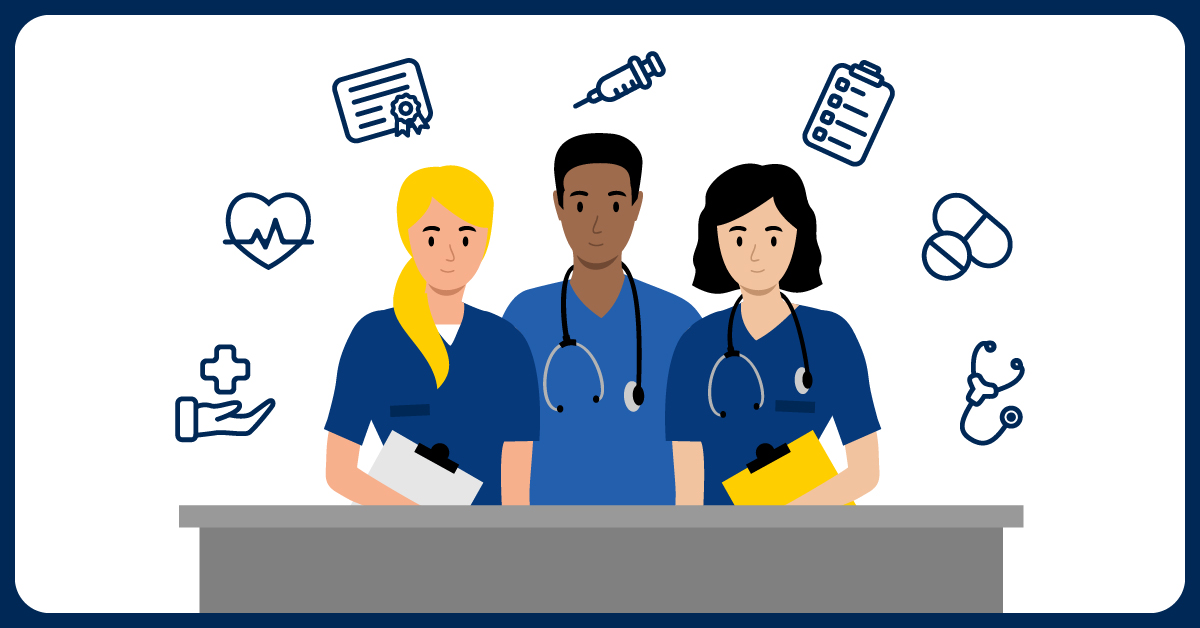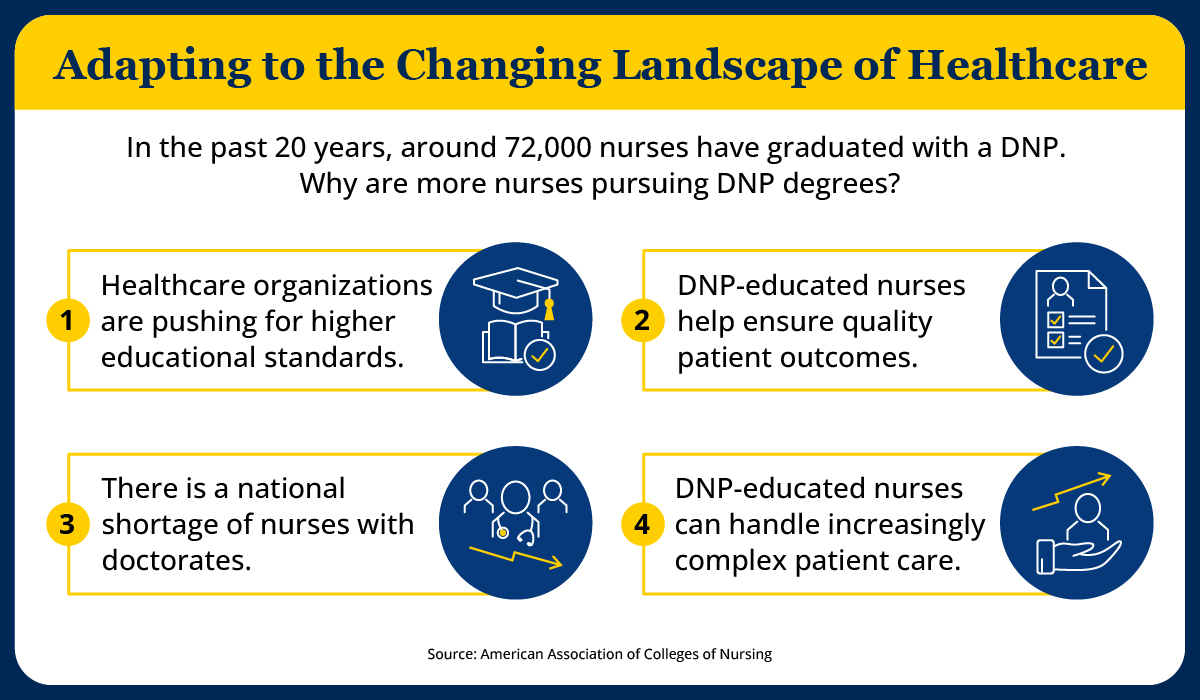Transforming Healthcare: How DNP-Educated Nurses Can Lead Change

With an aging patient population and an increasing number of patients requiring treatment for chronic diseases, the healthcare industry’s need for advanced practice registered nurses (APRNs) and experienced leaders is more pronounced than ever. Further compounding the issue is the national nursing shortage the country currently faces. With nurses exiting the workforce at a faster rate than they’re entering, the healthcare industry is in a precarious situation that requires immediate course correction.
Transforming healthcare and stabilizing care delivery isn’t just about educating and training more nurses: Healthcare organizations need more nursing professionals with advanced clinical skills and leadership abilities to elevate the standard of care across the board. One critical way that nurses are preparing to shape the future of healthcare delivery is by earning a Doctor of Nursing Practice (DNP) degree, a terminal degree that represents the highest level of nursing practice education.
To illustrate the importance of DNP programs, this article will examine the advanced training and clinical skills gained through a DNP program, the benefits of earning a DNP degree, career opportunities for DNP graduates, and why more nurses are choosing to invest in this post-master’s educational path.
What Is a DNP Degree?
A DNP degree is a terminal degree, representing the highest level of nursing practice education. It is also the alternative to a PhD in nursing, which is a research-focused doctorate. A DNP prepares high-level nurse leaders to apply research in practice to improve patient outcomes. The current complexity of the healthcare system requires that APRNs are prepared to deliver the highest quality of care and improve patient outcomes. Although DNP programs differ in credits and coursework, they all adhere to the DNP Essentials which are standards set by the American Association of Critical-Care Nurses (AACN). The DNP curriculum focuses on evidence-based practice research, informatics, organization and systems leadership, policy, systems thinking, interprofessional collaboration for improving population health, and quality improvement.
Types of DNP Programs
A common DNP question concerns the types of programs that are available. To expand the pool of DNP-educated nurses, colleges and universities across the country have rolled out different approaches to the DNP to accommodate learners at different points in their nursing careers. The following are the four main types of DNP programs:
- RN to DNP: Designed for current RNs who have yet to earn a bachelor’s degree, this program takes from four to six years to complete, the longest of any DNP program.
- BSN to DNP: Designed for those who have a Bachelor of Science in Nursing (BSN) degree, this bridge program can be completed in approximately three to four years.
- MSN to DNP: Designed for nurses with a master’s, this program can be completed in approximately two years.
- Online DNP: Online DNP programs typically follow a hybrid format, with coursework done online and clinical practicums completed in person. Online MSN-to-DNP programs can be completed in two years or less, while online BSN-to-DNP programs typically take three to four years.
DNP Curriculum
Although curricula and formats vary by institution and program, they always include DNP-level coursework and a certain number of clinical hours, which can vary based on how many clinical hours the student has already completed in their prior degree programs.
The following are some examples of DNP-level courses:
- Nursing Informatics
- Biostatistics
- Ethical Principles for Advanced Nursing Practice
- Application of Nursing Research
- Epidemiology and Environmental Health
- Collaboration in Healthcare Delivery
- Diversity and Social Issues
- Leadership in Advanced Nursing Practice
- DNP Project
MSN vs. PhD vs. DNP Programs
MSN programs are designed to prepare registered nurses for advanced practice roles or managerial positions. The MSN program is ideal for nurses who want to gain advanced clinical skills in a specific area of nursing practice or move into roles in administration, education, or leadership. This includes training to become a nurse practitioner, nurse anesthetist, nurse midwife, or clinical nurse specialist.
A PhD in Nursing (sometimes called a Doctor of Science or Philosophy in Nursing) is a research-focused degree designed to prepare nurses for careers in scientific inquiry and academic leadership. PhD programs emphasize generating new knowledge that can enhance nursing practice, research, education, and policy. They are ideal for those interested in the theoretical underpinnings of nursing practice who want to conduct independent research that contributes to the academic and scientific communities. PhD curricula generally include courses focused on data collection, research, and health policy.
DNP programs are designed to prepare nurse leaders at the highest level of practice to apply research and improve healthcare outcomes. They emphasize developing leadership skills in clinical settings, improving systems of care, and influencing healthcare policy and outcomes. DNP programs are well suited for nurses who want to improve quality of care, become leaders in healthcare innovation, and educate the next generation of nurses. Their curricula usually focus on research applications, leadership, and social issues in the field.
Why Nurses Are Choosing to Earn DNP Degrees
Since 2004, the American Association of Colleges of Nursing (AACN) has endorsed a position statement that promotes raising the minimum education level for APRN roles from the MSN to the DNP. While this has not yet become an official requirement, it reflects the broad changes in the demand for healthcare services, the expansion of professional expectations, and the evolving roles of nurses in both clinical and leadership positions.
Following are several personal and professional reasons why more nurses are choosing to earn DNP degrees:
Enhanced Clinical Skills
As the healthcare landscape increases in complexity, the need for professionals with advanced clinical expertise is growing. A DNP can help nurses hone their clinical acumen to the highest level and apply healthcare research to improving patient care.
Leadership Opportunities
DNP programs help nurses hone the leadership skills they need to take on high-level responsibilities, including managing teams, directing clinical programs, and implementing health policies. DNP graduates are qualified for a variety of leadership roles throughout the healthcare system.
Increasing Demand for Highly Qualified Nurses
Demand is high for nurses at all levels, but particularly for APRNs who can practice as primary care providers. With an increasing emphasis on high-quality care, preventive care, and chronic condition management, organizations recognize the value of employing highly educated nurses to take on complex roles. Moreover, healthcare facilities know that DNP-educated nurses can share their expertise with less experienced clinicians.
Advocacy and Policy Impact
DNP programs often include components that focus on health policy and advocacy, preparing nurses to influence healthcare policies at the local, state, and national levels. DNP-educated nurses can play pivotal roles in shaping policies that improve patient care, address health disparities, and make nursing education more accessible.

Commitment to Lifelong Learning and Professional Advancement
The DNP degree represents the pinnacle of nursing practice education, appealing to those who are dedicated to their personal and professional development. Earning a DNP can also significantly enhance a nurse’s professional opportunities in leadership roles, help them earn high-level credentials and certifications, and qualify them to open their own practices in states with full practice authority. By extension, these DNP-educated nurses can help serve as part of the solution to the country’s current physician shortage.
Desire to Improve Healthcare Systems
Nurses with a DNP are equipped to make substantial improvements in healthcare systems. This includes developing innovative solutions to clinical challenges, enhancing healthcare delivery models, implementing systems-level changes, and translating evidence based research to practice to improve patient outcomes. Their advanced training allows them to address complex problems and become leading proponents of transforming healthcare for the better.
Financial Incentives
Financial considerations also play a role in the decision to pursue a DNP. Advanced practice nurses and nurse leaders with a DNP often command higher salaries and have access to more opportunities for advancement compared to their counterparts with other degrees. According to Payscale, DNP-educated nurses had a median salary of approximately $112,000 per year as of April 2024.
DNP Career Paths
Individuals with a DNP are qualified to take on any of a number of high-level professional roles that offer the potential to impact healthcare delivery and patient outcomes. The following are positions that DNP graduates can pursue:
Nurse Practitioner
Nurse practitioners (NPs) are APRNs who provide primary, acute, and specialty healthcare services. They assess patients, diagnose illnesses, manage treatment plans, and prescribe medication in states where their practice authority allows it. NPs often serve as primary care providers and are known for their patient-centered approach to care that emphasizes health promotion, disease prevention, and health education.
Clinical Nurse Specialist
Clinical nurse specialists (CNSs) are expert clinicians working in specialized areas of nursing practice such as oncology, cardiac care, gerontology, and pediatrics. CNSs provide patients with diagnoses, treatments, and ongoing disease management while influencing care outcomes through integrating evidence-based practices with care delivery. They also act as consultants to other nurses and healthcare professionals and help drive changes in practice within their organizations.
Certified Registered Nurse Anesthetist
Certified registered nurse anesthetists (CRNAs) are highly skilled APRNs who administer anesthesia during surgical procedures of all types, from minor arthroscopic surgeries to major operations. They are responsible for managing patients’ anesthesia needs before, during, and after surgery, ensuring that they are safe and comfortable.
Certified Nurse Midwife
Certified nurse midwives (CNMs) provide prenatal, labor and delivery, postpartum, and gynecological care to patients. CNMs offer a holistic approach to childbirth and reproductive health, emphasizing natural birthing options and the wellness of parents and children.
Program Director
Program directors in healthcare settings oversee a specific clinical program or department. They manage the program’s development, implementation, and evaluation, ensuring that healthcare services meet patients’ needs and comply with regulatory standards. Their responsibilities often include budgeting, staffing, project management, and quality improvement.
Research Manager
Research managers in nursing lead clinical research projects, overseeing, developing, and implementing research studies. They ensure that studies are effectively designed and ethically conducted and that their findings are thoroughly analyzed and accurately reported. DNP-prepared research managers also work to translate research into practice, in an effort to improve patient outcomes and care protocols.
Nurse Manager
Nurse managers oversee nursing staff and the daily operations in a specific unit or department. They are responsible for staff scheduling, onboarding, and performance reviews, and for maintaining high standards of care. Nurse managers also play a key role in mentoring and developing nursing staff, managing conflicts, securing facility resources, and implementing patient safety measures.
Health Policy Analyst
Health policy analysts with a DNP background use their knowledge of nursing and healthcare to influence health policy decisions. They analyze existing policies, propose improvements, and work with stakeholders to implement policy changes. Their work aims to improve healthcare access, quality, and efficiency.
Chief Nursing Officer
Chief nursing officers (CNOs) are top executives in healthcare organizations, responsible for overseeing all nursing operations. They set strategic directions for nursing practice, seek to improve the quality and safety of patient care, manage budgets, and represent nursing perspectives in executive decision-making. CNOs ensure that the nursing workforce is adequately prepared to meet the needs of their communities.
Current Challenges in the Healthcare Landscape
The modern healthcare industry is facing challenges in terms of meeting the resource needs of facilities, maintaining high standards of care, and addressing the increasing demand for medical services. Additionally, organizations are focused on managing the chronic diseases of an aging population, improving healthcare access and equity, reducing healthcare costs, and improving patient outcomes and safety.
However, the process of transforming healthcare can’t truly begin until the nursing shortage issue is addressed. Of the nurses who responded to a survey conducted by McKinsey & Co. in September 2022, 31% reported that they were “likely” to leave their current direct patient care role in the next year.
The U.S. Bureau of Labor Statistics (BLS) expects there will be 193,100 job openings available for registered nurses each year in the decade ending in 2032, with most of those openings being due to nurses pivoting to different occupations, retiring, or exiting the labor force. The remainder of the openings will be to fill new jobs, with the BLS projecting that positions for registered nurses will increase 6% between 2022 and 2032, double the projected growth rate of the labor market as a whole.
Filling those positions will be a challenge without expanding the educational resources to train and develop new nurses. According to the AACN, over 55,000 qualified applications were turned away from entry-level BSN programs in 2023 due to factors that included a shortage of nursing instructors. Those numbers were even higher during the height of the pandemic, with over 76,000 turned away in 2021 and over 66,000 turned away in 2022.
To address the root of the issue, educational resources must be expanded across the country to accommodate the large population of aspiring RNs. This means rolling out more nursing programs and training more nurse educators to oversee them, including through DNP programs. Fortunately, DNP programs have been steadily growing for the past 15 years. The AACN reports there are now more than 425 DNP programs nationwide.

Role of DNP-Educated Nurses in Transforming Healthcare
DNP-educated nurses are uniquely positioned to address many of the challenges the healthcare industry currently faces. The following are the four main ways they will contribute to shaping the future of the healthcare landscape:
1. Leadership in Clinical Settings
With their advanced clinical skills and leadership capabilities, DNP-educated nurses are equipped to develop patient care strategies that are efficient, based on scientific evidence, and focused on improving outcomes.
2. Advocacy and Policy Change
DNP-educated nurses are prepared to advocate for favorable policy changes that can lead to more equitable and effective healthcare practices. By engaging with policymakers and stakeholders, they can influence legislation and policy, focusing on issues like population health, healthcare accessibility, and elevating the quality of care.
3. Driving Operational Improvements
With their thorough understanding of healthcare systems, DNPs can lead efforts to optimize operations within healthcare facilities. This includes implementing quality improvement initiatives, enhancing patient safety protocols, and using data analytics to improve healthcare practices and outcomes.
4. Education and Mentorship
As leaders, DNP-educated nurses also contribute to the education and professional development of nursing staff and healthcare teams. They are positioned to mentor less experienced nurses, fostering a culture of continuous improvement and learning within healthcare organizations. They also hold tenured and clinical faculty positions in colleges and universities.
Advance Your Leadership and Clinical Skills With a DNP Degree
DNP-educated nurses hold the keys to transforming healthcare and offsetting the current nurse and physician shortages. Their advanced training in clinical practice, leadership, and healthcare policy makes them invaluable in navigating and directing the future of patient care. As the demand for more sophisticated and equitable healthcare practices continues to grow, nurses with a DNP will lead the way in creating innovative solutions and achieving better health outcomes.




